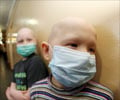Experts carrying out a world health probe said Monday fear and the lack of a clear severity assessment had hampered the response to the swine flu pandemic over the past year.
Experts carrying out a world health probe said Monday fear and the lack of a clear severity assessment had hampered the response to the swine flu pandemic over the past year.
The issues were raised by several of the 29 experts in their inaugural meeting to examine the controversial response to the first flu pandemic of the 21st century."We want to know what worked well. We want to know what went wrong and ideally why," World Health Organisation Director-General Margaret Chan told the panel of external specialists meeting in Geneva.
"We want to know what can be done better and ideally how," she added, nearly a year after a global alarm was raised over the new swine flu strain uncovered in the Mexico and the United States.
Swine flu has affected 213 countries or territories since April 2009, leaving 17,700 people dead, WHO data showed.
The WHO probe was set up following accusations that the agency-led international reaction to A(H1N1) influenza, including a pandemic declaration last June, was overblown and may have been tainted by commercial interests.
Panel members and officials said that sporadic outbreaks of more lethal bird flu had boosted pandemic preparations, including stronger International Health Regulations enforced in 2007 and the stockpiling of anti-viral drugs before swine flu appeared.
Advertisement
Australian infectious diseases specialist John Mackenzie said that public reaction became guarded when the new A(H1N1) swine flu virus turned out to be far less lethal even though the WHO had declared a pandemic.
Advertisement
"It wasn't that mild when you see the number of deaths in the young, but the customer expected it to be much more severe," said Mackenzie, who has been closely involved in determining the response to the swine flu pandemic.
Professor Harvey Fineberg of Washington's Institute of Medicine, who was appointed chairman of the WHO panel, said it was "a very central problem."
Several of the health specialists, who are mainly attached to public authorities, also raised the need for an additional severity assessment in the flu alert rulebook approved by the 193 WHO member states.
The six phase international alert system culminates with a pandemic, which primarily denotes global geographic spread, an issue that led to "confusion" or "irritation", the panel heard.
Kuku Voyi, a public health professor at South Africa's University of Pretoria, suggested a "bandwidth" of severity could allow a better response.
But there were warnings that the impact of swine flu varied in different settings, with a greater threat to impoverished countries or among groups such as pregnant women or the young.
Many Western countries welcomed the WHO's swift leadership but called for a reassessment of the flu alert phases and severity criteria, and the need for consistent and clear communications.
Kenya and India urged the panel to consider obstacles for poor countries' access to medicines and vaccines, noting that rich countries had priority on pandemic orders because of their wealth.
"That is not a situation that should be tolerable at all, especially with a global problem," Kenya's delegate said.
Chan promised an "independent, credible and transparent" examination by the International Health Regulations Review Committee over the next nine months, "without a straitjacket".
Parliamentarians conducting a Council of Europe probe have criticised the transparency of decision-making and especially the potential weight of the pharmaceutical industry in a decision on vaccination.
Several governments sought to cancel mass orders of hundreds of millions of dollars worth of swiftly developed special pandemic vaccines after fears about the severity of swine flu waned.
Source-AFP
SRM













